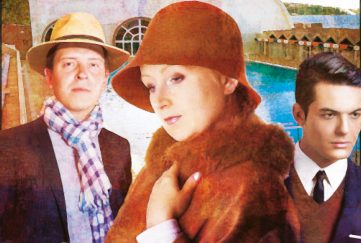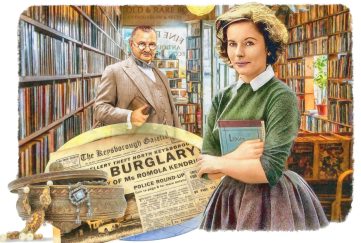A Quiet Honeymoon – Episode 03

WINE was brought, and after ten minutes the young woman was sitting up.
“I cannot believe such a thing,” she said. “That policeman said he has been killed. Murdered.” She turned clear blue eyes on Ruth. “How?”
Ruth hesitated.
“I cannot say, not yet. A blow, possibly.”
The girl gasped, and large tears began to flow down her cheeks.
“Mr Quirk is my father’s . . . was my father’s advisor in matters of money. But he was really my father’s friend.” Her eyes flitted to the door. “Papa will be home from Chichester. What will he do? He will be distraught.”
Eventually Ruth managed to introduce herself. The girl did the same, in a bizarre parody of a ladies’ tea party.
“My name is Mary Greville, and my father is Matthew Greville. This is our house,” she said rather pointlessly. “Why are you here?” she asked suddenly. “The policeman . . .?”
“He’s my husband,” Ruth said. “We are on honeymoon.”
Mary Greville frowned.
“Honeymoon,” she said softly. “I am engaged to be married in September.”
“Congratulations,” Ruth said, feeling how very odd it was to be talking like this. “So Mr Quirk was your father’s financial man?” Her instinct was to gather information. She knew Terence would still be examining the scene outside.
“Yes. Father has a considerable . . . well, he has done well in shipping, out of Portsmouth.”
Ruth nodded.
“And Mr Quirk assists him?”
“Mary, darling!”
Ruth looked up at the sound of a deep male voice. A grey-haired man entered the room. He was bearded, with a kind, distinguished face.
“Father!”
He knelt by his child and they embraced tightly. He looked at Ruth as he did so. His face showed shock and a terrible sadness.
“I came to the garden entrance,” he said, his brow furrowed by distress. “I knew Mary would have tea laid for James outside. I saw him. I can’t believe this. I can’t believe anyone would do this thing.”
Eventually he and his daughter ended their long embrace, and he sat on the edge of a Queen Anne chair, his face grey.
“I suppose the police will find that it was some hooligan, some miserable thief,” Mr Greville said. “But in our village! Never before has such violence occurred here! Nobody would want to kill James Quirk, unless it was in order to steal from him.”
Mary was nodding.
“The sweetest, kindest man.”
The two of them, father and daughter, sat and thought for a long minute.
“He was our fusspot,” her father said, smiling for the first time, and looking at Mary, “and more and more a fusspot as he got older.” He sighed. “We were to grow old together, or so we thought.”
“A fusspot?” Ruth queried.
“Oh, not in a trying way. James was the most loyal man. It was just that he had begun to worry about the household, and ask that I check the accounts rather often. It was of no use to tell him not to worry. All is in order, and plenty in the bank. Our needs are few, and our income always exceeds our outgoings, however much I try to make my darling buy new clothes, and plan her wedding.” He turned suddenly to his daughter. “Oh, the wedding! We must send for Philip!”
“Philip will want to carry on,” the girl said, “and so will I. What would Mr Quirk say if he knew I had postponed the event he so anticipated?”
“Do you think that Mr Quirk was really anxious about something?” Ruth asked.
Mr Greville thought for a moment.
Ruth learned that no wife lived at Brakenham House. Mr Greville, Ruth noticed, did not speak of his wife. She wondered if she was dead, and if that was another great grief. Instead he gave a brief account of his life, his days at Oxford and career in shipping. Mary explained that she was engaged to another merchant, a gentleman from Emsworth. Philip Young had a house there, and Mary would live there once married.
“There, they will be just about close enough to me,” her father said, smiling at Mary, “But I will miss my Mary. When I myself am gone, of course, this house will be hers ”
Mary stood, walked to his chair and held his hand. Then she turned to Ruth, her lovely face hardened by determination.
“Mrs Greene,” she said. “They must find whoever did this, whatever miserable wretch killed Mr Quirk.”
Soon afterwards, Ruth left them. She walked back through the garden to find a draped stretcher being borne on foot down the lane, and her husband standing beside a stout policeman in uniform.
“Sergeant Brown,” Terence said, giving Ruth a steady look, “has agreed to telegraph the Oxford station to confirm that I may assist until further investigating officers can be sent.”
“I see,” Ruth said.
Sergeant Brown coughed.
“I understand that Sergeant Greene here has some experience, Mrs Greene, in such matters. The Wittering force, I admit, is somewhat lacking. But I am sorry that your honeymoon here should be disturbed.”
It appeared that Mr Quirk had not, in fact, been robbed. A tidy pocket-book was still on his person, with 30 shillings inside, and other items in good order. The local policemen returned to the station and Ruth and Terence began their walk back to the boarding house.
“Do you think it was a hooligan?” Ruth asked.
“No, I don’t,” he replied, “because though he was found in the lane, he died inside the property.”
Ruth’s eyes widened.
“The grass I looked inside it was depressed, sloping in the direction of the gate.”
“Miss Greville and I walked through.”
“No, not with your footmarks,” Terence said. “It was flattened, and quite a mess, as though . . .” He looked at Ruth. “I might almost say as though it had been washed. The grass is long it would be possible to make blood wash away among the grass and into the soil.
“Where was the body brought from?”
“The lawn only covers twelve feet around the gate’s archway. Further towards the house the garden is paved.”
Ruth walked to the entrance and looked inside.
“You’re right.”
“We must find out,” Terence said, “who was in and around the house yesterday.”
















